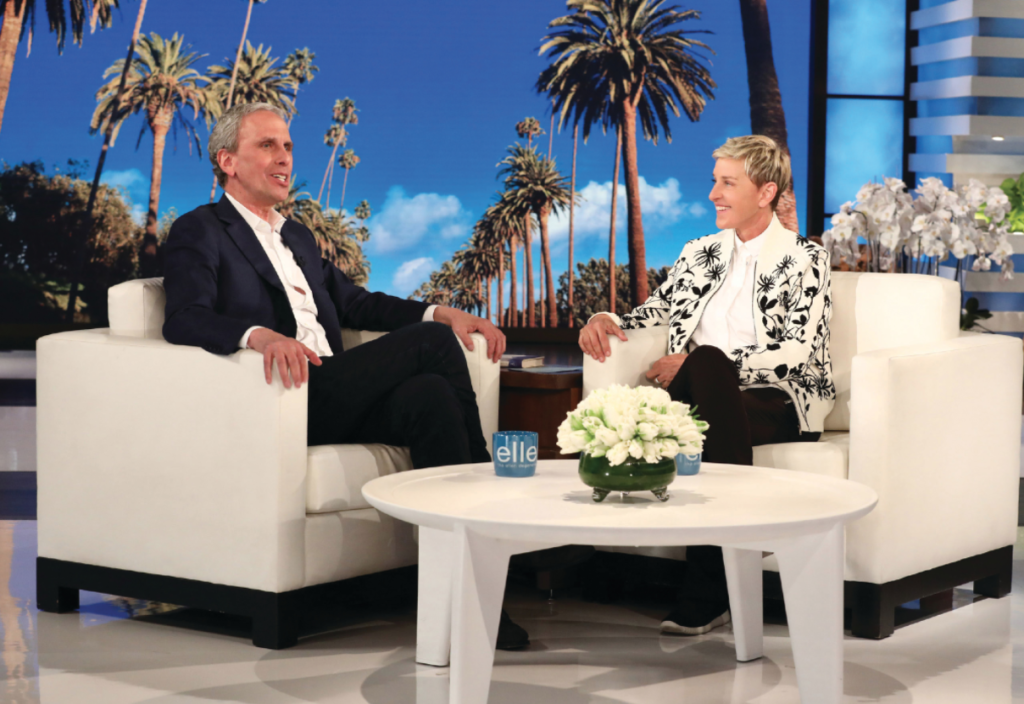
By Bob Roth
Seven years ago, Bob Roth, author of the recent New York Times best-seller Strength in Stillness: The Power of Transcendental Meditation, taught Ellen DeGeneres how to meditate because, she told Roth, “I wanted to maintain permanent connection with the intelligence that runs the universe.” Then she paused and said, “and I can’t sleep at night.” Science has proven this 5,000-year-old practice improves not only sleep, but focus, resilience, creativity and memory. For 45 years, the David Lynch Foundation, which Roth heads up, has been applying that science to solving problems faced by trauma-suffering veterans, inner-city school kids, and in at-risk communities.
ELLEN DEGENERES: If you’re going to learn transcendental meditation this is the guy to learn it from. Tell people what TM is.
BOB ROTH: Transcendental meditation is a very simple, easily learned technique that’s done for about 20 minutes, twice a day, sitting comfortably in a chair. It allows your active, agitated, thinking mind to settle down and access a field of calm that lies deep within us. I like to use the analogy of an ocean—there are choppy, turbulent waves on the surface of the water. You could think the ocean is just upheaval, but when you go deep within the ocean, it’s silent. Our mind is the same way.
ED: It calms you down. There’s a survey that says just about every young adult stresses six hours a day, on average. We’re all stressed today with what’s going on in the world. Now, more than ever, is a time that people should meditate.
BR: We are living in an epidemic of stress. It undermines our immune system. We get sick and [it affects our] digestion, memory, the ability to sleep. Too much stress kills us. We crave quiet. Transcendental meditation is effortless diving within and accessing that calm.
ED: Explain some of the other things that it does for you.
BR: It transforms the brain and the body. Meditation reduces anxiety twice as much as other relaxation techniques, as well as depression and insomnia. It wakes up the brain, improves memory, focus and creativity. For people who have high blood pressure and heart disease, it’s more effective than even anti-hypertensive medication.
ED: We have a noisy world, and a lot of people have kids and a noisy household. It’s really hard to find time. I posted a picture on my Instagram the other day—Portia [de Rossi, DeGeneres’ wife] was trying to meditate, and had three dogs on her lap, one cat. She managed to still do it, but it’s really hard to meditate when you are distracted.
BR: That’s why you want to do it first thing in the morning. It’s twice as deep as the deepest part of deep sleep, giving us more energy. There are 1,440 minutes in a day, so we’re talking about 40 minutes for self-care.
ED: People spend so much time exercising from the neck down. We do everything to take care of our body when the most important thing is our mind. I have a lot of anxiety with what’s going on in the world. I have to come out here and be happy every single day, and I want to feel clear. The only way to do that is to get to that quiet place and be silent and still.
BR: What does it feel like when you meditate?
ED: It feels like I’m home. Everyone gets used to the noise. Have you ever been in a room and you hear this humming sound and until it turns off, you didn’t realize there was a noise? I had no idea how noisy everything was until I was still and quiet. I’m grateful to you for teaching me this, because it’s changed my life.
For more information about meditation, go to tm.org and davidlynchfoundation.org



